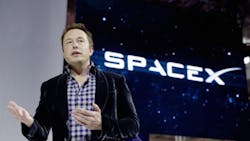Boeing, SpaceX Safety Risks May Delay US Astronaut Travel
Boeing Co. and Space Exploration Technologies Corp. won’t be certified this year to send astronauts to space and may be delayed into 2019 because of potential safety hazards, according to U.S. investigators.
Boeing parachute systems haven’t been adequately evaluated and SpaceX engine turbines have cracked during testing, the Government Accountability Office said in a report Thursday that outlined risks to the company programs. The National Aeronautics and Space Administration agreed to renegotiate its contracts with Boeing and SpaceX to delay certification reviews that had been scheduled for this year, the GAO said.
The lagging certification process is significant because the U.S.’s contract with Russia for transportation to the International Space Station expires in 2019. Any lapse between when the contract with Russia ends and Boeing or Elon Musk’s SpaceX being ready would hamper returns on the billions of dollars NASA has invested in the station, the GAO said.
“Given the delays in the Commercial Crew Program, GAO recommends that NASA develop and report to Congress on its contingency plans for maintaining a U.S. presence on the ISS beyond 2018,” the agency wrote in its report.
Since the Space Shuttle program ended in 2011, American astronauts have relied on Roscosmos, the Russian Federal Space Agency, to ferry them to the station. NASA selected both Boeing and SpaceX in 2014 to develop commercial crew transportation capabilities.
Rocket Risks
NASA is reviewing Boeing’s parachute testing plans to determine whether enough data will be generated, the GAO said in its report. Officials with NASA and the United Launch Alliance, a joint venture between Boeing and Lockheed Martin Corp., also have struggled to access design data involving the Russian-built engine Boeing is using to verify that it meets certification requirements.
Cracks that formed in the turbines of SpaceX’s engine during testing in 2015 pose “an unacceptable risk for human spaceflight,” NASA told the company. SpaceX is making design changes that address the cracking issue, according to the report.
The GAO’s findings follow a September report by NASA’s Office of Inspector General, which warned of “multiple challenges that will likely delay the first routine flight carrying NASA astronauts to the ISS until late 2018.” Agency funding challenges, delays in NASA’s evaluation process and technical challenges with spacecraft designs have all contributed to the program falling behind schedule.
About the Author
Bloomberg
Licensed content from Bloomberg, copyright 2016.
